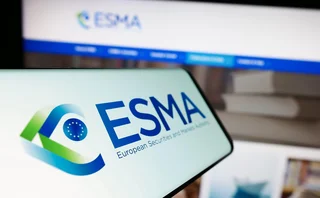
Derivatives volumes soar in US, says OCC
Notional derivatives volumes held by US commercial banks increased by $3.8 trillion in second-quarter 2002, to $50.1 trillion - the second highest amount ever recorded, the US Office of the Comptroller of the Currency (OCC) reported yesterday in its quarterly Bank Derivatives Report.
The OCC also reported that earnings attributable to the trading of cash instruments and derivatives activities increased by $225 million in the three-month period, to $3.4 billion. Revenues from interest rate positions increased by $60 million to $1.6 billion, while revenues from foreign exchange positions increased by $132 million to $1.3 billion. Revenues from equity activities increased by $83 million to $490 million.
But the report also noted that total credit exposure, which consists of both the netted current mark-to-market exposure, as well as potential future exposure, increased by $79.6 billion to $525 billion. "The big decline ininterest rates during the quarter caused a pretty sharp increase in credit exposures," Brosnan said. "We expected this. Almost 60% of the notional volumes outstanding are swaps, and the lion's share of that is for interest rates. When rates fall, contracts where the bank receives a fixedrate go up in value and that gives higher credit exposures."
Brosnan added that credit quality of derivatives exposures is holding up well - given the economic climate and well-publicised corporate bankruptcies.
During the second quarter, the notional amount of interest rate contracts increased by $3.4 trillion, to $42.7 trillion. Foreign exchange contracts increased by $183 million, to $5.8 trillion. This figure excludes spotforeign exchange contracts, which increased by $332 billion, to $504 billion. Equity, commodity and other contracts increased by $85 billion, to $1.1 trillion. Credit derivatives increased by $54 billion, to $492billion.
Paul Lyon
Only users who have a paid subscription or are part of a corporate subscription are able to print or copy content.
To access these options, along with all other subscription benefits, please contact info@risk.net or view our subscription options here: http://subscriptions.risk.net/subscribe
You are currently unable to print this content. Please contact info@risk.net to find out more.
You are currently unable to copy this content. Please contact info@risk.net to find out more.
Copyright Infopro Digital Limited. All rights reserved.
As outlined in our terms and conditions, https://www.infopro-digital.com/terms-and-conditions/subscriptions/ (point 2.4), printing is limited to a single copy.
If you would like to purchase additional rights please email info@risk.net
Copyright Infopro Digital Limited. All rights reserved.
You may share this content using our article tools. As outlined in our terms and conditions, https://www.infopro-digital.com/terms-and-conditions/subscriptions/ (clause 2.4), an Authorised User may only make one copy of the materials for their own personal use. You must also comply with the restrictions in clause 2.5.
If you would like to purchase additional rights please email info@risk.net
More on Regulation
Review of 2025: It’s the end of the world, and it feels fine
Markets proved resilient as Trump redefined US policies – but questions are piling up about 2026 and beyond
Hong Kong derivatives regime could drive more offshore booking
Industry warns new capital requirements for securities firms are higher than other jurisdictions
Will Iosco’s guidance solve pre-hedging puzzle?
Buy-siders doubt consent requirement will remove long-standing concerns
Responsible AI is about payoffs as much as principles
How one firm cut loan processing times and improved fraud detection without compromising on governance
Could one-off loan losses at US regional banks become systemic?
Investors bet Zions, Western Alliance are isolated problems, but credit risk managers are nervous
SEC poised to approve expansion of CME-FICC cross-margining
Agency’s new division heads moving swiftly on applications related to US Treasury clearing
ECB bank supervisors want top-down stress test that bites
Proposal would simplify capital structure with something similar to US stress capital buffer
Clearing houses warn Esma margin rules will stifle innovation
Changes in model confidence levels could still trip supervisory threshold even after relaxation in final RTS







